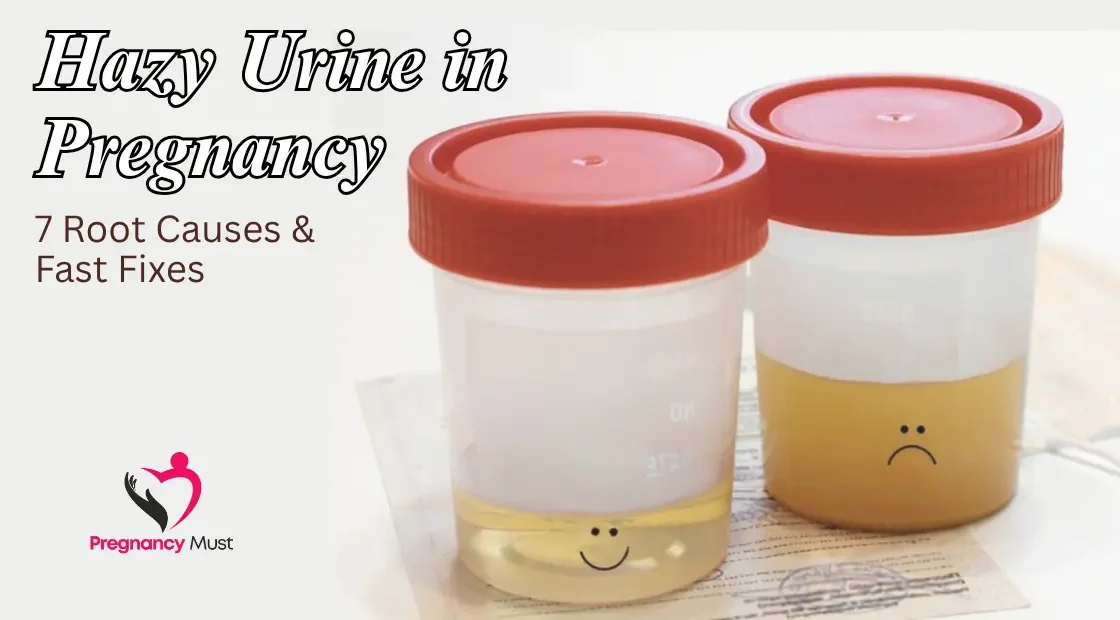Hazy urine in pregnancy is a common symptom that many expecting moms experience—but it often causes confusion and concern.
Whether it’s hazy urine in pregnancy, cloudy pee while pregnant, or just general cloudy pregnancy urine, this guide explains everything you need to know about the causes and solutions.
Table of Contents
- What is Hazy Urine in Pregnancy?
- Why is Your Cloudy or Hazy Urine in Pregnancy? (Top 7 Causes)
- 1. Dehydration – The Most Common Culprit Behind Hazy Urine in Pregnancy
- 2. Urinary Tract Infections (UTIs) – A Serious Yet Treatable Issue
- 3. Increased Vaginal Discharge – A Normal Pregnancy Side Effect
- 4. Proteinuria – Could It Be Preeclampsia?
- 5. Pregnancy Hormones – The Invisible Change-Makers
- 6. STIs (Sexually Transmitted Infections) – A Hidden Danger
- 7. Diet & Supplements – The Unexpected Culprits
- How to Prevent Cloudy or Hazy Urine in Pregnancy
- Safe Home Remedies for Hazy Urine While Pregnant
- FAQs About Cloudy or Hazy Urine in Pregnancy
- Final Thoughts: Don’t Panic Over Hazy Urine in Pregnancy Moments
What is Hazy Urine in Pregnancy?
Hazy urine during pregnancy refers to urine that looks foggy, cloudy, or milky rather than clear or straw-colored. It’s usually noticed when you go to the bathroom and spot a change in the appearance of your pee.
Let’s be clear—hazy urine pregnancy doesn’t always signal a problem. Sometimes it’s totally normal due to hormonal changes. But other times, it may point to a medical issue.
Why is Your Cloudy or Hazy Urine in Pregnancy? (Top 7 Causes)
1. Dehydration – The Most Common Culprit Behind Hazy Urine in Pregnancy

Hazy urine in pregnancy often starts with something simple: not drinking enough water.
🔍 Why It Happens:
- During pregnancy, your body’s fluid demand skyrockets.
- Amniotic fluid, increased blood volume, and waste removal all require extra hydration.
- If you are not drinking enough water, your urine becomes concentrated and may appear cloudy or hazy.
- And this is particularly prevalent in your 2nd and 3rd trimester, when the amount of blood in your body nearly doubles.
🩺 How It Affects You:
- Dehydrated urine may appear darker, have a strong odor, or feel warm when passed.
It can bump your chances for urinary tract infections, fatigue, constipation — and in its worst case, preterm contractions.
- Long term dehydration also causes light headedness and low amniotic fluids that may interfere with the development of the child.
✅ What You Should Do:
- Drink 8–12 glasses of water daily—more if it’s hot or you’re active.
- Include hydrating foods like:
- Cucumbers
- Watermelon
- Oranges
- Broths and soups
- Use a water reminder app to track your intake throughout the day.
💡 Tip: If your pee is dark yellow and cloudy during pregnancy, you’re likely dehydrated. Increase water intake and monitor for improvement within 24 hours.
2. Urinary Tract Infections (UTIs) – A Serious Yet Treatable Issue
Hazy urine in pregnacy is often caused by UTIs. Pregnant bodies are more vulnerable due to hormonal and physical changes.
🦠 How UTIs Cause Cloudiness:
- It is like bacteria going from the urethra to the bladder.
- Appearance of cloudy or milk production in urine are due to inflammation and the presence of pus.
- Hormonal relaxation of the urinary tract prolongs urine movement thereby offering the bacteria enough time to multiply.
🚨 Symptoms to Watch:
- Painful urination.
- Urine that is intense or bad.
- Turbid or confusion of the urine during pregnancy.
- Pain in the lower abdomen or in the back.
- Low Yields of Urinary Urgency and Frequency.
- Some intermittent fever of a low grade with chills.
🧬 What You Can Do:
- See a doctor immediately. Early treatment with safe antibiotics is essential.
- Drink unsweetened cranberry juice – it helps prevent bacterial adhesion in the urinary tract.
- Maintain hygiene and pee after sex to reduce bacterial buildup.
⚠️ Warning: Untreated UTIs can lead to kidney infections, early labor, or even sepsis. Always take Hazy urine in pregnancy seriously if symptoms persist beyond 24–48 hours.
3. Increased Vaginal Discharge – A Normal Pregnancy Side Effect
Sometimes hazy urine in pregnancy isn’t urine at all—it’s discharge mixing with it, a completely normal phenomenon.
💡 Why It Happens:
- Pregnancy hormones like estrogen increase blood flow to the vaginal area.
- This triggers more cervical and vaginal mucus, which may drip and mix with urine.
- Later in pregnancy period, the discharge enlarges in order to protect the birth canal against any infection.
✅ When It’s Normal:
- White or milky discharge
- Odorless or mildly sweet smell
- No itching, burning, or pain
- Clear or slightly sticky texture without discoloration
❗ When to Be Concerned:
- Discharge is green, yellow, chunky, or smells fishy—signs of infection like bacterial vaginosis or yeast.
- You feel itchiness, redness or discomfort in the vulgva area.
- Discharge is over poured and soaks through underwear on a multiple daily basis.
👩⚕️ What to Do:
- Keep the vaginal area clean and dry.
- Wear breathable cotton underwear and avoid synthetic fabrics.
- Get tested if discharge changes suddenly in color, smell, or consistency.
4. Proteinuria – Could It Be Preeclampsia?
Finding protein in your urine during pregnancy isn’t always normal—especially if it’s paired with hazy urine and swelling.
🧪 What Causes Proteinuria:
- It may be a portent or forewarning of preeclampsia (characterized by high blood pressure and invite of body organs).
- It is usually during the 20th week in pregnancy.
- The protein may seep out of kidneys in the urine because of stress or inflammation.
🔍 Warning Signs Include:
- Swelling in hands, feet, or face
- Headaches and blurred vision
- Sudden weight gain
- Cloudy urine pregnancy symptoms
- Upper right abdominal pain (near the liver)
🛑 What to Do:
- Schedule a urine test during your prenatal visit.
- Monitor your blood pressure regularly at home.
- Eat a low-sodium diet, stay active, and follow up with your OB-GYN closely.
🧠 Important: Early detection and proper management are vital. Left untreated, preeclampsia can lead to serious risks for both mother and baby, including seizures (eclampsia).
5. Pregnancy Hormones – The Invisible Change-Makers
Hormonal shifts are behind many strange body changes—and cloudy pee while pregnant is no exception.
🔄 What Happens:
- Your kidneys adjust to processing higher blood volumes.
- Hormones like progesterone relax the urinary tract, slowing urine flow.
- Slight cloudiness or milky appearance may result, especially in the first trimester.
- Slight haze of urine may be also caused by the increase of white blood cells.
✅ When It’s Harmless:
- The cloudiness comes and goes.
- There are no symptoms like pain, odor, or discomfort.
- It happens without fever or unusual discharge.
No Need to Panic If:
- Your lab tests are normal.
- You’re staying hydrated.
- Your doctor has ruled out infections or proteinuria.
- Otherwise you feel well and there is no discomfort in the pelvis.
Calm down and move on- it is likely that it is your hormones just trying to figure out how to deal with pregnancy.
6. STIs (Sexually Transmitted Infections) – A Hidden Danger
Yes, certain STIs can cause cloudy pregnancy urine, and many go unnoticed unless tested.
STIs That Cause Cloudy Urine Include:
- Chlamydia
- Gonorrhea
- Trichomoniasis
- The other viral or bacterial STDs which afflict the urinary and reproductive systems.
Symptoms May Include:
- White, cloudy, or an abnormal smelling urine
- Sex pain
- Pelvic discomfort
- Iching or burning in the genital area
- Unusual discharge (e.g. greenish, yellow, or foamy) Spotting or after sex bleeding
What You Should Do:
- Get tested early in pregnancy and again in the third trimester if needed.
- Use protection during intercourse, even if you’re in a monogamous relationship.
- Follow your OB-GYN’s advice—many STIs can be treated safely during pregnancy.
Untreated STIs can harm your baby, leading to preterm birth, infections, eye issues, or complications during delivery. Early detection is key.
7. Diet & Supplements – The Unexpected Culprits

Sometimes, what you eat or take as supplements can temporarily alter urine color or clarity, causing cloudy pee pregnancy symptoms.
Diet-Related Causes Include:
- High-protein diets (excess meat or shakes)
- Foods like asparagus, garlic, or onions – cause sulfuric odor and murky pee
- Too much dairy or salty food strains the kidneys and affects urine
Supplement-Related Triggers:
- Taking vitamin B6 or iron may make urine dark and cloudy
- Certain prenatal vitamins have component(s) that can change the urine composition
Is It Harmful?
- Usually not.
- These changes are cosmetic and short-term if you feel normal otherwise.
- No need to worry unless other symptoms like pain or odor develop.
What to Do:
- Don’t skip your prenatal vitamins—just stay informed.
- Eat a balanced, varied diet rich in fruits, whole grains, and veggies.
- If unsure, bring a food and supplement log to your next OB-GYN visit.
Try drinking lemon or lime water to help flush your system, support kidney function, and keep urine clear.
How to Prevent Cloudy or Hazy Urine in Pregnancy
Here is a simple rundown to stay clear and healthy pee during your pregnancy:
Stay Hydrated – Clear the Cloudiness Before It Starts
Hazy urine in pregnancy is often a sign of dehydration, which is entirely preventable.
Why It Matters:
- Your body needs more water to support increased blood flow, amniotic fluid, and waste removal.
- Without enough fluids, urine becomes concentrated—making it appear cloudy during pregnancy.
How Much to Drink:
- Aim for 2.5 to 3 liters (8–12 glasses) of water per day.
- Drink more in hot weather, or after activity.
Tips to Stay Hydrated:
- Carry a water bottle everywhere.
- Flavor water naturally with cucumber, mint, or lemon.
- Eat hydrating foods like watermelon, soups, and oranges.
Cloudy pee pregnancy tip: The clearer your urine, the better hydrated you are!
Maintain Hygiene – Prevent Infection-Related Cloudy Urine During Pregnancy
Good hygiene habits help reduce the risk of UTIs, which are a major cause of cloudy urine pregnant women face.
Key Hygiene Practices:
- Wipe front to back after using the toilet—this prevents bacteria from spreading from the rectal area to the urinary tract.
- Avoid scented soaps, bubble baths, or douches—these irritate sensitive pregnancy skin and disrupt vaginal flora.
- Change underwear daily and wear breathable cotton fabrics.
Clean habits = fewer infections = less cloudy pregnancy urine.
Balanced Diet – Nourish to Prevent Haziness
The healthy diet keeps kidneys healthy and lowers the risk of developing the hazy urine in pregnancy symptom due to the abundance of waste or inflammation.
What to Eat:
- Fiber-rich foods: Leafy vegetables, greens, and vegetables (Aid in digestion and detoxification)
- Hydrating vegetables: Cucumber, zucchini, lettuce
- Low-sodium choices: Too much salt strains kidneys and increases water retention
What to Limit:
- Processed foods and excess dairy
- Excess animal protein or salty snacks
A balanced diet ensures your urine stays clear, your kidneys function well, and your baby gets optimal nutrition.
Regular Checkups – Catch Problems Before They Start
The visits that you go to during pregnancy are not merely to take photos of the ultrasound baby; the visits are the most serious in stopping adverse reasons why the urine is hazy urine in pregnancy.
What Urine Tests Reveal:
- Signs of proteinuria (linked to preeclampsia)
- Early-stage UTIs, even if you have no symptoms
- Dehydration levels or sugar traces in urine
Checkup Schedule:
- At every prenatal appointment, your urine is usually tested with a dipstick or lab analysis.
Early detection = early solution. Don’t skip checkups, even if you feel fine!
.
Safe Home Remedies for Hazy Urine While Pregnant

- Lemon water: Helps flush kidneys naturally.
- Barley water: Acts as a mild diuretic.
- Coconut water: Replenishes electrolytes.
- Dandelion tea: Helps reduce excess water retention.
Be sure to always check with your doctor before starting any herbal remedy during pregnancy.
FAQs About Cloudy or Hazy Urine in Pregnancy
Q1: Is hazy urine normal during pregnancy?
Yes, hazy urine in pregnancy can be normal as a result of hormone changes or due to some mild dehydration. Persistent or stinky urine should be looked at.
Q2: What does it mean when my pee is cloudy while pregnant?
It might mean you’re dehydrated, have a low-level infection, or that you’re experiencing more discharge. Sometimes, it’s just hormonal.
Q3: Should I worry if I notice cloudy urine during pregnancy?
Not every time, but if symtoms are accompanied with a pain, fever, or swelling, contact your doctor.
Q4: Can prenatal vitamins cause cloudy urine?
Yes, vitamins like B-complex and iron supplements can temporarily affect the clarity of your urine.
Q5: How do I know if cloudy urine is a sign of a UTI or something else?
If you feel burning while peeing, pressure in the lower belly, or have a fever—see your doctor for a UTI test.
Final Thoughts: Don’t Panic Over Hazy Urine in Pregnancy Moments
Having Hazy urine in pregnancy doesn’t indicate that anything is wrong. Most often, it’s manageable and temporary.
The key is to:
- Stay hydrated
- Monitor for other symptoms
- Communicate with your doctor regularly
Knowing the 7 causes of hazy urine in pregnancy can help you with the information you need to know in order to ensure you’re safe, and stress free during your pregnancy.
Explore more on Pregnancy Must –









